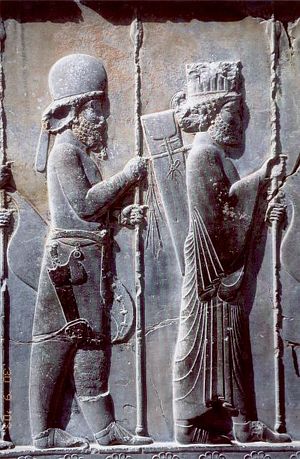Any country would be unnerved by accusations that some of its citizens may be traitors and spies. This is more so the case in Iran, a country with a long history and a long memory of treachery.
Iran recently executed a nuclear scientist accused of defecting to the United States. Shahram Amiri claimed, unconvincingly, that he had been abducted by the CIA before returning to Iran, and eventually to his end. Iran is extra-sensitive to treason because of historical reasons; treason is associated with the collapse of many dynasties and empires in Iran.
The first Iranian empire, the Median Empire, was also the first to fall due to treason, as described by Herodotus and verified in a Babylonian chronicle. The Medes, led by their king Astyages, were facing a revolt by their feudatories, the Persians. However, the Median army, led by one Harpagus, defected on the field to the Persians. This is because Astyages previously “took the son of Harpagus, and slew him, after which he cut him in pieces, and roasted some portions before the fire, and boiled others,” before feeding him to his father.
Subsequently, the Persian Empire ruled Iran and much of the Near East for two centuries, before Alexander the Great defeated Persian forces at the decisive battles of Issus and Gaugamela. The Persian king, Darius III, fled eastwards to Bactria (Balkh, Afghanistan) in order to rally his forces, but was murdered by his satrap Bessus, who may have been trying to curry favor with Alexander (other reasons have been proposed, including disillusionment with the king’s leadership). This precluded further organized Persian resistance against Alexander and Bessus was soon executed for his crimes by Alexander. Thus ended the Achaemenid Persian Empire in 330 B.C.E. Many honorable leaders in the pre-modern era did not accept treasonous acts, even if those acts were performed for their benefit. For example, Genghis Khan was said to have absolutely despised traitors of any sort and had them all killed.
Interestingly, the last king of the second great Persian dynasty, the Sasanians, met a very similar end to Darius III a thousand years later. The Arabs had invaded Iran, and after a crushing defeat at Nahavand, Persian military power collapsed. The last Sasanian king, Yazdegerd III, fled the eastern parts of his empire, where he too was murdered by a miller at the behest of one of his marzbans (governors), Mahuy Suri of Merv.
This incident is recounted by Ferdowsi, the author of the national epic of Persia, the Shahnameh. According to him, Mahuy told the miller, who was hosting the king at his mill to “cut the man [Yazdegerd]’s head off; if you refuse, I’ll cut your head off here and now and leave not one member of your family alive.” Subsequently, the miller, “his heart filled with shame and fear,” approached the king and “plunged a dagger beneath his ribs.” Mahuy’s own knights saw this from afar and disproved of this act, saying “may Mahuy’s body be like his [the King’s], weltering in its blood on the ground.”
Thus, there is a long history of Iranian regimes coming to an ignominious end due to the treachery of other Iranians. This is not to mention the various Iranians of the 20th century who were seen as stooges of various Western powers.
No wonder that Iran today continues to be so sensitive toward treason.

































